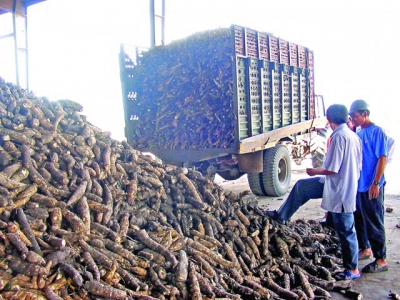Vietnam mastering extraction of Nano cellulose from cassava

A Hanoi University of Science and Technology research group has conducted a scientific study on the potential of Nano cellulose from cassava bagasse for use by the pharmaceutical and food industries. The study was ordered by the Ministry of Industry and Trade within the framework of a biotechnology application and development project in the processing sector.
Great potential
Cassava is an important industrial crop, contributing to the development of animal feed, food, paper, textile, alcohol and medicine. Vietnam currently ranks fourth in cassava production in the region, with high export turnover (more than US$1.2 billion in 2017).
In addition to the finished product, the current production process of cassava starch creates a large amount of cassava bagasse - the dry pulpy residue left after the extraction of the cassava from its root. A part of this by-product is used for the production of animal feed and biogas, but much of it is not utilized and causes serious environmental pollution.
Due to its high content of organic matter, cassava bagasse is often used as organic fertilizer. Cassava bagasse is not only a by-product but also a potential source of material given its residue starch and high cellulose content. Therefore, the Ministry of Industry and Trade has cooperated with the Hanoi University of Science and Technology’s School of Biotechnology and Food Technology to conduct research on recovering residue starch and cellulose.
Success in Nano cellulose production
Nano cellulose technology is a completely new field in Vietnam. To produce Nano cellulose from cassava bagasse, residue starch must be recovered first to separate it from the cellulose. Cassava bagasse is then bleached to create Nano fibrillated cellulose (NFC) and Nano crystalline cellulose (NCC). According to test results, the recovery rate of NFC reached 60.2 percent, while that of NCC stood at 65 percent.
The Hanoi University of Science and Technology has coordinated with the National Institute of Drug Quality Control under the Ministry of Health to apply Nano cellulose in pharmaceutical production, and with the Hai Chau Co., Ltd. in cake production.
Nano cellulose has unique properties. It is strong with a large surface area, non-toxic, biodegradable and easily modified. Owing to these characteristics, it can be used to enhance the strength of paper, as fillers and additives to composites, super water absorbent material, flexible and transparent thin films, additives in cosmetics, oxygen barrier for food packaging and many more.
Experimental results show that NCC has potential use in stabilizers and emulsifiers, while NFC can be converted into thin films used in cosmetics thanks to good moisture and its resistance to UV rays.
Currently, the School of Biotechnology and Food Technology has completely mastered NCC and NFC production technologies. If research results are commercialized, it will contribute to increasing the production value and reducing environmental pollution for the cassava industry.
Có thể bạn quan tâm
 Covid-19 epidemic puts pressure on agriculture restructuring
Covid-19 epidemic puts pressure on agriculture restructuring The spread of the coronavirus disease (COVID-19) has affected most aspects of Vietnam’s economy, especially the agriculture sector.
 Asia rice: Thai drought raises supply jitters, Vietnam rates at over 1-yr high
Asia rice: Thai drought raises supply jitters, Vietnam rates at over 1-yr high Drought conditions in Thailand stoked concerns of a supply shortage and lifted rice export prices to a more than 6-1/2 year high this week
 Fruit, vegetable export targets unlikely to be achieved in 2020
Fruit, vegetable export targets unlikely to be achieved in 2020 Fruit and vegetable exports are unlikely to hit the target of US$4-5 billion set for this year, according to the Việt Nam Fruit and Vegetables Association.
 Bamboo rats help farmer escape poverty
Bamboo rats help farmer escape poverty Breeding bamboo rats has helped poor farmers escape poverty in the southern province of Bà Rịa-Vũng Tàu, where bamboo is abundant.
 Bến Tre Province tells farmers to tie up with companies for steady demand, prices
Bến Tre Province tells farmers to tie up with companies for steady demand, prices Authorities in the Cửu Long (Mekong) Delta province of Bến Tre have encouraged farmers to co-operate among themselves and with companies to improve farming